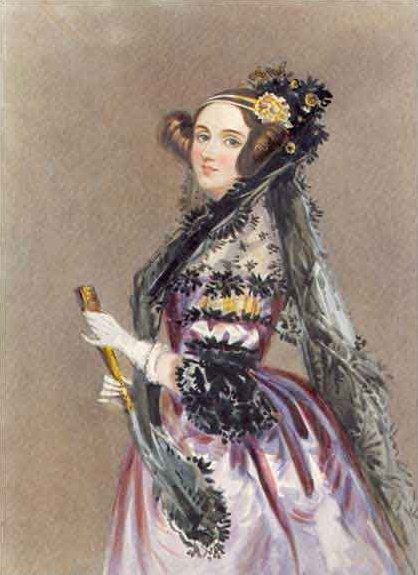Ada Lovelace, the first computer programmer
Augusta Ada King, Countess of Lovelace (10 December 1815, London – 27 November 1852, Marylebone, London) was the only legitimate child of George Gordon Byron, the famous poet. She is widely known as Ada Lovelace. She is now famously described as the “first programmer”.
only legitimate child of George Gordon Byron, the famous poet. She is widely known as Ada Lovelace. She is now famously described as the “first programmer”.
Early Life and Education
After her parents separation in 1816, Ada remained with her mother; her father did not attempt to claim his parental rights. Struggling with serious illnesses during her childhood did not impede her from developing her interest in mathematics. Lovelace was privately home schooled in matehmatics and science by William Frend, William King and Mary Somerville.
Marriage
On 8 July 1835 she married William King, 8th Baron King, later 1st Earl of Lovelace in 1838. They had three children; Byron born 12 May 1836, Anne Isabella (called Annabella, later Lady Anne Blunt) born 22 September 1837 and Ralph Gordon born 2 July 1839. Other than Mary Somerville, scientific author of the 19th century, who introduced her in turn to Charles Babbage on 5 June 1833, her circle of friends included Sir David Brewster, Charles Wheatstone, Charles Dickens and Michael Faraday.
Death
Lovelace died, at the age of 36, on 27 November 1852. This was due to uterine cancer and bloodletting by her physicians.
Achievements
She is mainly known for having written a description of Charles Babbage’s early mechanical general-purpose computer, the analytical engine. She is today appreciated as the “first programmer” since she was writing programs—that is, manipulating symbols according to rules—for a machine that Babbage had not yet built. She also foresaw the capability of computers to go beyond mere calculating or number-crunching while others, including Babbage himself, focused only on these capabilities. Over one hundred years after her death, in 1953, Lovelace’s notes on Babbage’s Analytical Engine were republished after being forgotten. The engine has now been recognized as an early model for a computer and Lovelace’s notes as a description of a computer and software.
Influence
- The computer language Ada, created by the U.S. Defense Department, was named after Lovelace.
- The reference manual for the language was approved on 10 December 1980, and the Department of Defense Military Standard for the language, “MIL-STD-1815”, was given the number of the year of her birth.
- Since 1998, the British Computer Society has awarded a medal in her name and in 2008 initiated an annual competition for women students of computer science.
Ada Lovelace Day (24 March 2009)
Ada Lovelace Day is an international day of blogging to draw attention to women excelling in technology. In 2009, over 1000 blogs were collected, highlighting women’s contributions. The organisers encouraged stories about ‘unsung heroines’ “Whatever she does, whether she is a sysadmin or a tech entrepreneur, a programmer or a designer, developing software or hardware, a tech journalist or a tech consultant, we want to celebrate her achievements.”
See Also
- Female Inventors
- Women in Science
- Women in Bio-Technology
- Female Nobel Prize Laureates
Sources
- http://www.facebook.com/event.php?eid=47550446005
- http://en.wikipedia.org/wiki/Ada_Lovelace


